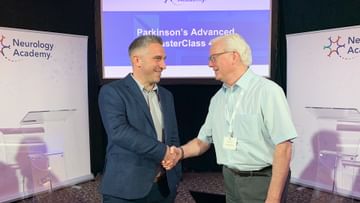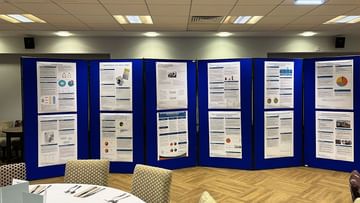Research Engagement – What is the Clinical Research Network; how can it assist you?
KnowledgeFor a number of years we have received feedback at the Parkinson’s Academy about including sessions about Research. Taking these responses and working with The Cure Parkinson’s Trust(CPT) and NIHR leads Dr Camille Carroll and Professor Oliver Bandmann, and the Academy’s Dr Peter Fletcher, we designed the Research Engagement meeting for professionals who are becoming or aspire to become involved with Parkinson’s research on many different levels.
The result was a stimulating meeting that started with defining the landscape of Parkinson’s research, showcasing how to move from a great research idea to delivering it in clinic, via giving an overview of how to get started in research and the support that is available whilst embracing the considerations from the perspectives of those living with the condition, and pragmatic approaches from those who have just started the journey.
In his introduction to the meeting CPT Trustee and Parkinson’s Academy Founding Faculty member Dr Peter Fletcher noted that we are currently at an interesting intersection in that there are trials of potentially disease modifying treatments underway and more on the horizon. The picture is changing rapidly and with urgency which makes this an exciting time to become involved in Parkinson’s research and importantly make that research available to patients.
Dr Camille Carroll, University of Plymouth
The Clinical Research Network provides support for researchers, both non-commercial and commercial, throughout the whole study cycle – from the conception of an idea through to successful study conclusion and dissemination of results.
Camille explained the broad structure of the CRN and what support infrastructure is available locally to researchers.
The NIHR provides the Research Design Service which offers free support for developing grant applications, helping researchers define research questions and methodology. It has advisors with specific skills in statistics, social science, health psychology, health economy, trial design, qualitative research methods, PPI and research ethics. This is an invaluable resource for both those just starting out in research, as well as experienced PIs and CIs who might need input on the latest legislation or thinking.
Both Commercial and Non-Commercial studies can be adopted by the CRN. Adoption is helpful and important as it allows overall evaluation of research delivery within the NHS, and triggers improvements, consistency and optimized delivery. Only a few studies with regional funding might be ineligible for adoption.
To qualify, a study must be research as defined in DoH and Social Care eligibility criteria, it must have ethical approval, be fully costed via the AcorRD guidance and Dr Carroll stressed the importance of ensuring studies are properly costed, as too many study teams are running at a loss because they are not properly costed at outset. Each local region will have an AcorRD specialist and the CRN has a very useful commercial costing template.
In conclusion she highlighted that the CRN is there to support individuals working in research at any level. The expertise nationally and regionally is there to ensure high quality research delivery. There is some excellent advice out there – knowing where to ask is the critical question.
Listen to this presentation:
Related articles
'The things you can't get from the books'
Parkinson's Academy, our original and longest running Academy, houses 23 years of inspirational projects, resources, and evidence for improving outcomes for people with Parkinson's. The Academy has a truly collegiate feel and prides itself on delivering 'the things you can't get from books' - a practical learning model which inspires all Neurology Academy courses.


